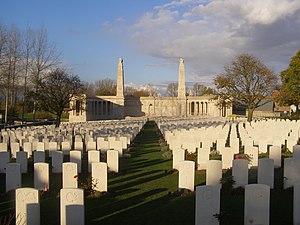This is an old revision of this page, as edited by Carcharoth (talk | contribs) at 18:58, 30 December 2009 (create article on Vis-en-Artois Memorial). The present address (URL) is a permanent link to this revision, which may differ significantly from the current revision.
Revision as of 18:58, 30 December 2009 by Carcharoth (talk | contribs) (create article on Vis-en-Artois Memorial)(diff) ← Previous revision | Latest revision (diff) | Newer revision → (diff)| Vis-en-Artois Memorial | |
|---|---|
| Commonwealth War Graves Commission | |
 View of the cemetery with the memorial in the background View of the cemetery with the memorial in the background | |
| For forces of the United Kingdom and South Africa | |
| Unveiled | 4 August 1930 |
| Location | 50°14′46.56″N 02°57′00.47″E / 50.2462667°N 2.9501306°E / 50.2462667; 2.9501306 |
| Designed by | J. R. Truelove (architect) Ernest Gillick (sculptor) |
| Statistics source: Cemetery details. Commonwealth War Graves Commission. | |
The Vis-en-Artois Memorial is a World War I memorial located near the commune of Vis-en-Artois, in the Pas-de-Calais departement of France. The memorial lists 9,843 names of British and South African soldiers with no known grave who were killed during the Advance to Victory, from 8 August 1918 to the Armistice (11 November 1918). The area of the front covered is described as "in Picardy and Artois, between the Somme and Loos". Canadian, Australian and New Zealand forces that fell during this period and were not found, are commemorated on other memorials to the missing.
The memorial has a screen wall in three parts on which are carved the names of the missing listed by regiment. The central screen is flanked by 70-foot high colums, with a Stone of Remembrance at centre. The carvings include one representing St George and the Dragon. The memorial was designed by the architect J. R. Trueloove, with sculpture by Ernest Gillick. The memorial was unveiled on 4 August 1930 by the Rt. Hon. Thomas Shaw. Shaw, a Labour Party MP and cabinet minister, was present in his role as British Secretary of State for War. Also present was General Walter Braithwaite, who had served in the Mediterranean and on the Western Front during the war.
External links
- Commonwealth War Graves Commission details of the Vis-en-Artois Memorial
- Further details of the cemetery and memorial